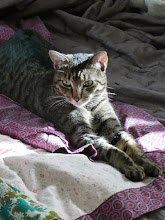Cupid the pig lived in Plymouth, UK, in the mid-18th century. He was the beloved friend and companion of a woman named Emma Gilbert, and is said to have shared her meals at her table, even accompanying her to London. As it happened, Emma was the Countess of Mount Edgecumbe, married to the 1st Earl of Mount Edgecumbe, and so in a position to treat her dearest friend with certain honors.
When Cupid died in about 1768, the Countess buried him near the family estate's folly, and had an obelisk built in his memory. The obelisk was later moved, and no pig found (or the golden casket in which he was supposedly interred). Or the pig may possibly be buried in a local area called Fern Dell. What I think really matters was the quality of the affection passing between these two. Don't forget this was during an age of Western philosophy when the idea of animals as feeling, suffering beings was becoming widely acknowledged.
Here's a news article from the Plymouth paper including not just Emma's Cupid, but a few more other family pet lovers.
And here's a post on Cupid from a fine blog on Plymouth local history.


2 comments:
Interesting post.
I get a bit confused about how people have related to animals over history.
Sometimes it seems that societies acknowledged their debt to the animals that gave them meat and other products - I've heard this as an explanation for the animal paintings in those prehistoric caves in France. And there's the idea of "totems" in many societies.
And yet, sometimes I read that it's a modern phenomenon to value animals as thinking and feeling beings.
Confusing.
I imagine it varies from place to place and even person to person - as, sadly, it still seems to today.
Post a Comment